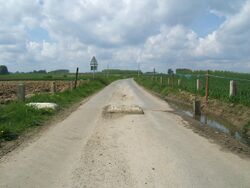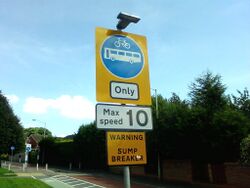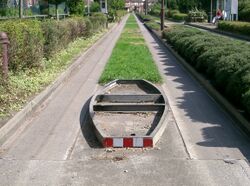Engineering:Sump buster

A sump buster is a device installed within a bus route to limit that thoroughfare to buses. It discourages traffic from entering a lane by promising to destroy the oil pan of any vehicle with insufficient ground clearance to get over it, making them similar in use (but not design) to rising bollards.[1] A sump buster can also be known as a "sump breaker" or "sump trap".[citation needed] Sump busters were first used in the 1980s.[2]
Function
The sump buster uses a non-mechanical solid mass of concrete, or sometimes other aggregates or metal, to demobilise a vehicle when access to a restricted area is attempted. When a vehicle attempts to traverse the sump buster, the device will demolish the vehicle's oil pan (literally "busting the sump"). The track and ground clearance on permitted vehicles, usually buses, is such that they may clear the device with ease.[3] In some cases, advisory or mandatory speed limits are given.
Impact on the community

A major purpose of the sump buster is to avoid road systems to be used as rat runs and, to a certain extent, joyriding. For this reason, devices have been vandalised (either through annoyance at their existence or to attempt to gain passage), resulting in accidents (and injuries) to legitimate road users.[4]
In January 2005, Devon County Council dismissed an application by the Stagecoach Group for the installation of a sump buster on Tan Lane (a restricted access road) in Exeter. The Exeter Highways and Traffic Orders Committee stated that "...[using a sump buster] is not an option that the County Council could support [as] it would not differentiate between high clearance vehicles and for example cars and vans that are authorised to use the link under the current Traffic Regulation Order".[5]
Sump busters have led to serious injuries to scooter drivers and cyclists who fail to notice them.[6][7] Municipalities in the Netherlands have been sued for tort after damage or injuries caused by insufficiently marked sump busters.[2][8][9]


See also
References
- ↑ GetReading: "'Panic' behind bugs gate closure"
- ↑ 2.0 2.1 Lodder, Arno R., and Bart Verheij. "13th BILETA Conference:'The Changing Jurisdiction'."
- ↑ Hawley, Ludmilla (1993) (in en). Towards Traffic Calming - a Practitioners' Manual of Implemented Local Area Traffic Management and Blackspot Devices. Federal Office of Road Safety. ISBN 978-0-642-51324-3. https://books.google.com/books?id=jGwnAQAAMAAJ&q=bussluis.
- ↑ "Ten hurt after road hump damaged". BBC. 2005-03-11. http://news.bbc.co.uk/1/hi/england/berkshire/4340951.stm. Retrieved 2009-10-01.
- ↑ "Committee Report". Exeter Highways and Traffic Orders Committee. Devon County Council. 2005-01-27. http://www.devon.gov.uk/index/democracycommunities/decision_making/cma/cma_report.htm?cmadoc=report_ed0529hq.html. Retrieved 2009-10-01.
- ↑ "Scooterrijder in Houten ziet bussluis over het hoofd en raakt ernstig gewond bij val". 18 March 2021. https://www.ad.nl/utrecht/scooterrijder-in-houten-ziet-bussluis-over-het-hoofd-en-raakt-ernstig-gewond-bij-val~acb18058/.
- ↑ "Babberich wil gevaarlijke bussluis weg: 'Zeker twee keer per week raak, tot botbreuken aan toe'". 19 September 2020. https://www.gelderlander.nl/zevenaar/babberich-wil-gevaarlijke-bussluis-weg-zeker-twee-keer-per-week-raak-tot-botbreuken-aan-toe~a8c72271/.
- ↑ Rechtbank Gelderland 9 June 2015, 3887736 \ AZ VERZ 15-7 \ 490 \ 413, Template:ECLITemplate:Language
- ↑ "Uitspraken van rechters" (in nl). https://www.fietsersbond.nl/ons-werk/wetten-en-regels/aansprakelijkheid-ongevallen-schade/uitspraken-van-rechters/.
 |
